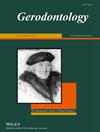Prolonged use of old dentures: A qualitative study with Brazilian older adults
Abstract
Objective
To explore older adults' perceptions, motivations and reasons for using and not replacing old and worn complete dentures over prolonged periods.
Materials and Methods
In-depth, semi-structured interviews were conducted with Brazilian edentulous older adults who were wearing complete dentures which were at least 20 years old. A purposive sampling method was used to recruit participants from an existing waiting list of those referred to a hospital clinic for new dentures. The interviews were video-recorded, transcribed verbatim and analysed using thematic analysis.
Results
Sixty-two individuals were assessed and nine were included in the study, aged from 61 to 77 years (mean = 65.4), with seven (77.8%) of them women. The reported time using their current dentures ranged from 22 to 45 years (mean = 28). Content analysis revealed three main themes: the perception of the current dentures' condition after prolonged use; reasons for the prolonged use and non-replacement; and unsuccessful attempts to replace the dentures. Overall, participants acknowledged the poor condition of their dentures and did recognise the need for replacement. Several factors had prompted them to delay or temporarily forego replacement, with financial constraints being the main barrier. Some reported failed attempts to replace the dentures in the past years or months; however, challenging adaptation to the new prostheses led to them reverting back to their old dentures as a fallback solution.
Conclusion
Factors influencing prolonged denture use in older adults include a complex interplay of financial aspects, treatment awareness, access and personal factors. Dental professionals can play a pivotal role in promoting timely denture adjustment or replacement by addressing these factors through patient education and personalised care.

 求助内容:
求助内容: 应助结果提醒方式:
应助结果提醒方式:


